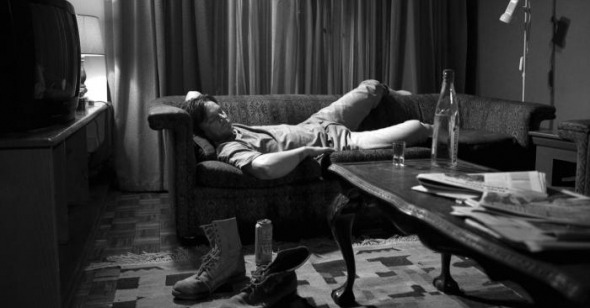Midlands Melodrama
By Leo Goldsmith
Somers Town
Dir. Shane Meadows, U.K., Film Movement
When we last encountered the British director Shane Meadows, he was chronicling the rise of skinhead antagonism in the flyover country of Thatcher’s England. A terse, intimate exploration of a nation in cultural flux, 2006’s This Is England cannily portrayed the mounting racial hysteria within the young, white working class, but still managed to avoid race-baiting exploitation. Never imagining itself to be above sympathizing with even the most repellent, Paki-bashing skinhead, Meadows’s film is not so much a “British History X” as a Mike Leigh film in Doc Martens, shouting only an occasional “Oi!” (The comparison with Leigh is not limited to citizenship alone: both directors use a great deal of rehearsal and improvisation to achieve their particular brands of kitchen-sink realism.)
Meadows’s new film, Somers Town, dovetails neatly with his last, offering a vivid contrast between the Eighties, when Britain's large unemployment numbers bred suspicion among the “true” English about their immigrant neighbors, and the 2000s, when the U.K.’s membership in the European Union has made ethnic diversity an inevitability. What makes this contrast more striking is Meadows’s shift of setting, from the provincial specificity of his native Midlands to the multi-ethnic urban enclaves of London. Shooting in the capital for the first time, and reteaming with This is England's young star, Thomas Turgoose, Meadows presents this move to the big city—with employment opportunities otherwise unavailable to those from all over England and Europe—as something of an inevitability itself.
Turgoose’s Tomo is a runaway teenager who comes to London from his native Nottingham because there is simply no reason to stay there—no family or friends that he will own up to, and certainly no chance of doing anything with his life. Not that his present situation is any more encouraging: he drifts around North London with little more than a bag and few cans of lager, until even these are stolen from him by a trio of bored young thugs. All but completely destitute, Tomo subsists on winsome charm and a smart mouth to ingratiate himself with Marik, a Polish kid about the same age, who lives a somewhat isolated immigrant’s existence with his father in a housing complex in Somers Town.
While Meadows has shifted his focus from the Midlands to the more sprawling metropolis, the title of the film evokes a very precise setting, the North London neighborhood bounded by the various railway lines running in and out of Euston, Kings Cross, and St. Pancras Stations. It’s this last railway station that figures most prominently in the film, as much of the shenanigans of Tomo and Marik are conducted— and the film shot—within a few hundred yards of the newly renovated terminal. Marik's dad even works there, and the Eurostar itself—the international railway link that operates between London and Paris via the Channel Tunnel—features as a significant plot point, partly because Eurostar financed the film. (This corporate source of funds, somewhat unusual for a British film, speaks less to Meadows’ “selling out” than to the company's courage in giving money for such a venture.)
As in all of Meadows’s films, Somers Town emphasizes the importance of character and particularly of camaraderie amongst male characters—here, teenagers who nick clothes from the local laundry, get drunk in the park, and furtively investigate the responsibilities of adulthood and masculinity. Meadows shoots in stark black-and-white 16mm, invoking the familiar, rough-and-ready quality of various international New Waves artifacts (especially Jules and Jim), but his concern remains provincially English. In spite of this potentially detached format, Meadows portrays a very close-knit and lived-in London whose changing face (and color and nationality) no longer depends on essentialist notions of king and country, but on the immediate concerns of a single, multifaceted neighborhood. Polish, French, and English characters alike are simply trying to subsist: Maria, the girl from France who waits tables in the nearby tea shop (and with whom Marik and Tomo both become infatuated); Mariusz, Marik’s heavy-drinking, hard-working father; or Graham, the odd, portly salesman of assorted (and decidedly dodgy) items, who gives the boys an occasional fiver for work (“No, not in a sexual way,” clarifies Graham). These are characters who have more in common with each other as members of a local, multicultural, and very accidental collective than they would with those from their respective homes. That each of these individuals is also immediately recognizable and effortlessly charming is a testament to Meadows’s low-key, but precise and evocative style.
